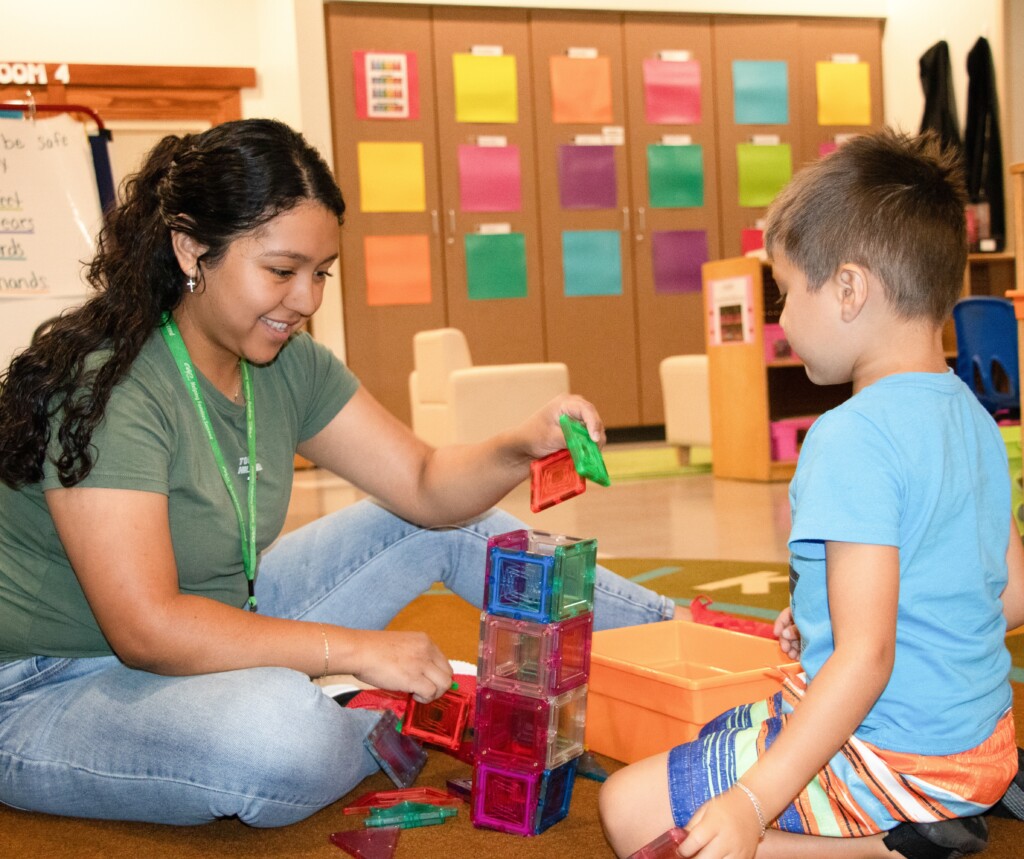CAP Tulsa: More than Daycare
The Importance of High-Quality Early Childhood Education

The 4-year-old boy had never been to preschool before. When he first set foot into the classroom, he was nervous. He was also nonverbal and needed individualized attention. But just six months later, that little boy was speaking and making friends. It’s exactly the kind of transformation that teachers and parents dream of seeing in their children. And it’s just one of many powerful outcomes being seen at CAP Tulsa as they lead the way in championing high-quality early childhood education for all Tulsans.
Rigorous Educational Standards, Backed by Research
Despite misconceptions, CAP Tulsa is not a daycare center. It’s a comprehensive Head Start program that guides disadvantaged children to education success. With 10 locations throughout the area, CAP Tulsa adheres to rigorous standards, offering an evidence-based curriculum, well-trained and certified teachers, and low student-to-teacher ratios for the families who qualify for its services. It has been designated as one of 20 centers of excellence by the office of Head Start and is considered a leader among early education programs across the nation. Over the past 25 years, the agency has served around 30,000 children and 20,000 families in the Tulsa community.
But even with all those accolades, CAP Tulsa is first and foremost about the children and the families they serve. Executive Director Karen Kiely takes a strategic, data-driven approach to their programming to ensure they’re achieving top-notch results. “There’s a growing body of evidence that high-quality early childhood education ensures future school success and individual success into adulthood,” she says. “So, I think of high-quality early childhood education as a community asset.”
The value of CAP Tulsa and programs like it becomes clear when results are measured inside and outside the classroom. Students who attend CAP Tulsa outperform children who didn’t attend preschool in language and math. Research shows that children who attend Head Start programs are less likely to become teen parents or engage in criminal activities, and more likely to graduate high school, attend college and earn higher wages.
In other words, when children from low-income and disadvantaged circumstances receive solid early educational support, they’re more likely to become stable adult members of society who then pass this success on to their children. These multigenerational benefits are why programs like CAP Tulsa exist, and why supporting them is so crucial to the community as a whole.
Help for the Whole Family
To bolster the children’s long-term success, CAP Tulsa provides support to the whole family.
“The young children we serve don’t exist in a bubble,” Kiely says. “They are surrounded by loving parents who happen to be living in poverty, and a lot of it is circumstances, such as catastrophic illnesses or health bills, loss of jobs, or being under-skilled for new employment.”
Support beyond the classroom can include everything from gas cards and food to clothes and diapers, as well as connections to services provided by community partners such as Family & Children’s Services. CAP Tulsa also offers English as a Second Language classes to help parents successfully advocate for their children. These offerings make it easier for parents and children to find lasting success, explains Paige Sicking, the agency’s Assistant Director of School Leadership and Education.
“We can do a lot for these babies,” Sicking says. “We can give them a foundation, but we have to help the parents as well. This whole-family approach allows for people to get help when needed to get them on their feet and stable, which then helps young children to feel safe, confident and ready to learn in the classroom.”
Teachers and Staff Who Understand the Families They Serve
“It takes a village to teach the kids, so we are a village,” says Zuleyma Perez, a Before Care Substitute with CAP Tulsa. “And if we can help our parents, that helps the kids as well.”
Perez knows this firsthand. Born in the U.S. and raised in Tulsa by parents who were originally from Mexico, Spanish was her primary language as a child. That made school difficult for her at first, because she didn’t understand what was going on. As she gained English skills, she took on the role of translating for her parents, a common need of CAP Tulsa’s families that she can relate to.
Bilingual classrooms ease both the parents’ and the children’s minds so that learning can take place, says Perez. It even eases her own mind when it comes to her daughter, who is thriving in CAP Tulsa’s program while Perez is at work. “She’s just so smart,” she says. “And I know that it has to do with CAP Tulsa. I have their support.”
Equipping Parents to Be Successful Advocates
CAP Tulsa also works with many children who have special needs, intervening early to help their families obtain resources and advocate wisely for them. As a substitute teacher for CAP Tulsa, Cristina Becerra not only teaches some of these children but benefits from the support as a parent.
Cristina’s own son was struggling with communication, she says, so CAP provided speech therapy and pointed her to helpful services in the community. “They basically helped him succeed in areas where he was not doing so well,” she says. “CAP Tulsa definitely likes to see families succeed, the community succeed. It’s a very helpful resource.”
And resources like this are essential, as they can be hard to find – and costly. “There’s not a lot of specialized services for young children who may have a special needs diagnosis or are not developing,” Sicking says. CAP Tulsa fills in some of that gap by partnering with different groups, such as Tulsa Tech and the Oklahoma Autism Network to provide needed services.
Effective Early Childhood Education Creates Economic Benefits, Too
“People dismiss us as healthcare, but high-quality early care and learning is a workforce issue,” notes Kiely. Many parents can’t afford the high cost of childcare and have nowhere to bring their children. As a result, they leave the workforce, impacting businesses and reducing tax dollars that could be spent to benefit the local community.
This is no small problem, either. The nation’s infant-toddler childcare crisis costs a stunning $122 billion in lost earnings, productivity and revenue every year, according to a recent study by ReadyNation, with $1.2 billion of that deficit affecting Oklahoma, according to Kiely. The effects of this crisis cascade to all the community’s residents, not just the families facing childcare challenges.
There are many ways Tulsans can support high-quality early childhood education for everyone. CAP Tulsa has ongoing needs for volunteers and certified teachers. They also accept donations, which go toward specific projects such as purchasing dual-language books, special-needs materials and emergency supplies for families, all of which are not covered by their federal and state grant funding. Most importantly, Tulsans can advocate for early childhood education with local legislators, letting them know this issue matters.
“We have an obligation as citizens to pay it forward and support this young generation and future generations by assisting them to become educated, productive members of our community,” says Kiely. “Everyone, whether they have young children or not, needs to care that the children are getting this early childhood education to be successful in school.”






